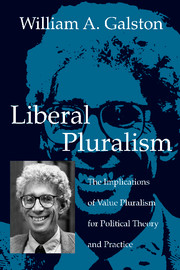Book contents
- Frontmatter
- Contents
- Acknowledgments
- LIBERAL PLURALISM
- I INTRODUCTION
- II FROM VALUE PLURALISM TO LIBERAL PLURALIST THEORY
- 2 Two Concepts of Liberalism
- 3 Three Sources of Liberal Pluralism
- 4 Liberal Pluralist Theory: Comprehensive, Not Political
- 5 From Value Pluralism to Liberal Pluralist Politics
- 6 Value Pluralism and Political Community
- III THE PRACTICE OF LIBERAL PLURALISM
- Index
3 - Three Sources of Liberal Pluralism
Published online by Cambridge University Press: 20 March 2010
- Frontmatter
- Contents
- Acknowledgments
- LIBERAL PLURALISM
- I INTRODUCTION
- II FROM VALUE PLURALISM TO LIBERAL PLURALIST THEORY
- 2 Two Concepts of Liberalism
- 3 Three Sources of Liberal Pluralism
- 4 Liberal Pluralist Theory: Comprehensive, Not Political
- 5 From Value Pluralism to Liberal Pluralist Politics
- 6 Value Pluralism and Political Community
- III THE PRACTICE OF LIBERAL PLURALISM
- Index
Summary
THE RESOURCES OF LIBERAL THEORY
I spoke earlier of the resources liberal theory can bring to bear on the adjudication of disputes between state power and individual freedom. Three concepts are of particular importance: expressive liberty, value pluralism, and political pluralism.
Expressive Liberty
The first concept is what I call “expressive liberty.” By this I mean the absence of constraints, imposed by some individuals on others, that make it impossible (or significantly more difficult) for the affected individuals to live their lives in ways that express their deepest beliefs about what gives meaning or value to life. An example of such constraints would be the consequences of the Inquisition for Iberian Jews, who were forced either to endure persecution or renounce their religious practices.
Expressive liberty offers the opportunity to enjoy a fit between inner and outer, belief and practice. Not all sets of practices will themselves rest on, or reflect a preference for, liberty as ordinarily understood. For example, being Jewish is not always (indeed, is not usually) a matter of choice. But once that fact is established through birth and circumstance, it becomes a matter of great importance for Jews to live in a society that permits them to live in accordance with their understanding of an identity that is given rather than chosen, and that typically is structured by commandments whose binding power does not depend on individual acceptance.
- Type
- Chapter
- Information
- Liberal PluralismThe Implications of Value Pluralism for Political Theory and Practice, pp. 28 - 38Publisher: Cambridge University PressPrint publication year: 2002



